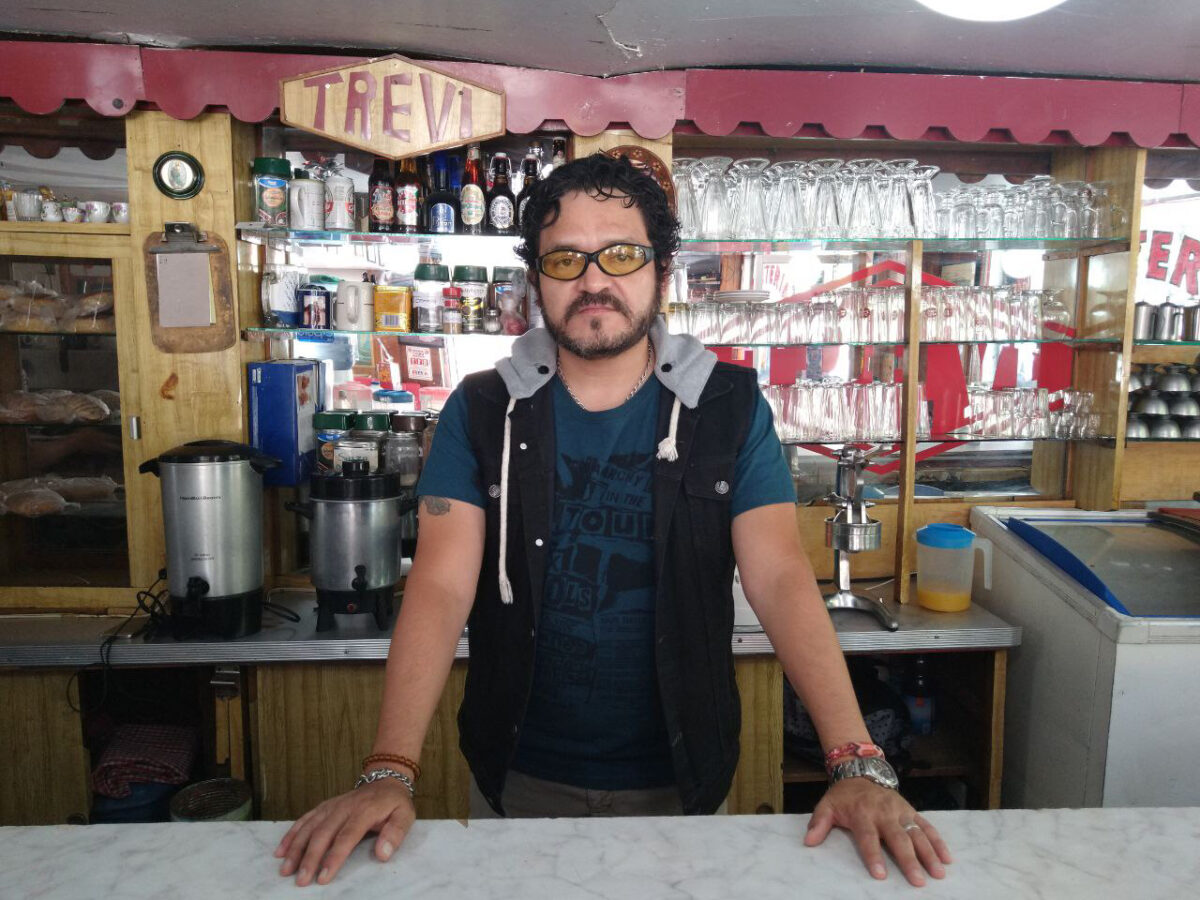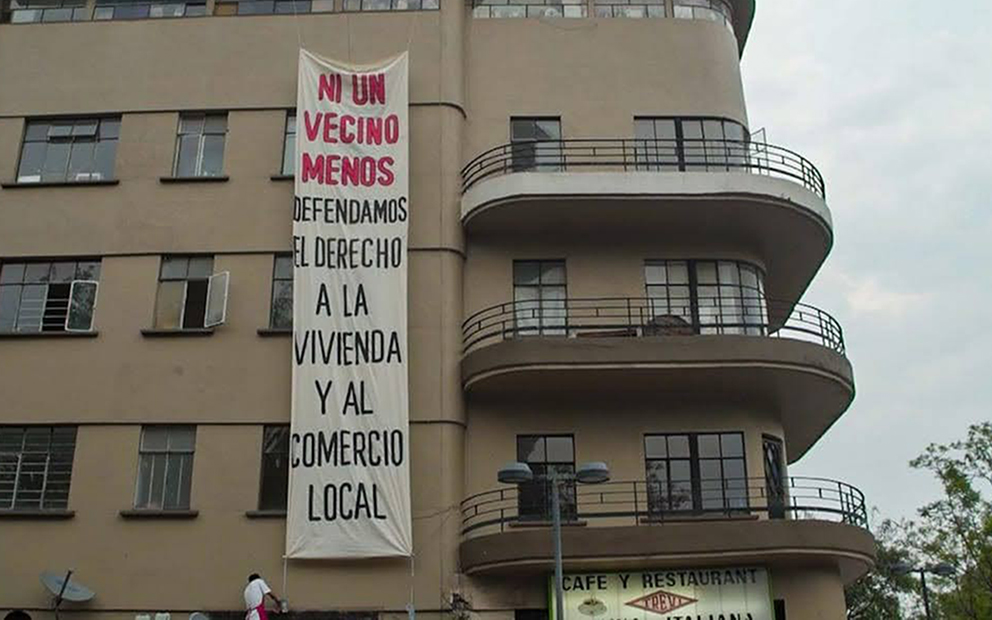“After two years of litigation, we decided to desist and make an agreement through compensation, which does not seem fair and we are not satisfied with it,” says Julio César Castillo with his elbow on the table and his fist clenched. For 20 years, he has commanded the Trevi cafeteria, which has seen the history of Alameda Central since the building’s construction more than 60 years ago.
In 2018 a company called Público came to the building. His intention is to transform the iconic Art-Deco building into a coworking space, a type of shared office. Also, in the development of apartments that would be rented from internet applications. Public, however, is not the legal owner of the building, but the owner is Trust 2476/2017.
Since then, Bancamifel, the settlor, took action to evict its tenants from the building. They tried to negotiate to buy the apartments where they live but were forced to leave the building little by little.
“These guys are very abusive, and they abuse their economic power. They do not care that people have 15 or 30 years in their homes, or like us, that we have been renting for 65 years ”, recognizes Julio César. Shake your head from side to side, squeeze your lids together, and continue.
“Gentrification won. One day people with money will come to move you. It’s not going to give you the option to stay just because you don’t have its economic potential. “

“It bothers me a lot that they want to transform this part of the Alameda. This part of the city is for the people, that is Diego Rivera’s message with his mural Un paseo en La Alameda ”. Julio César refers to Dream of a Sunday afternoon in the Alameda Central, a mural that can be seen in a museum on the same block as the Trevi building. “It’s for everyone, but it’s not going to be like that anymore. The project they are doing is to make a difference, it is to do something class-based, with businesses that are not going to be available to most people ”.
Crucible of Struggles
Despite the end result, the winnings of a neighborhood fight are worth numbering.
The Trevi struggle served as a melting pot in which various neighborhood struggles, of evicted people, organized neighbors, artists and activists were articulated. The compensation obtained is the result of that struggle, in which a group of citizens decided to fight for their rights; also the organization that wove.
His neighbors participated in the defense against the reform of article 60 of the Human Rights Law of the City. The law obliged the government to guarantee housing for people who were victims of extrajudicial or forced evictions, but poor writing and a media campaign against it caused that protection to be canceled. They were also part of the proposal to change the laws that regulate tenant relations in the city and that promote a Tenant Law for Mexico City.
Gentrifiers and foul play: the signature that was true
Many of the tenants started lawsuits to defend their stay in the building. However, little by little they were thrown out of court on the plaintiffs’ suspicions for lack of due process and corruption.
The Trevi case, like that of other neighbors, for example, began to falter because Banca Mifel filed a lawsuit alleging that the signatures on existing lease contracts were false.
“We went to do tests with graphological experts,” says Carlos Acuña, who was evicted from the building several times. “José Luis Dávila –the legal owner of the Trevi cafeteria– is in very poor health and could not go to the expert meeting. Well, she was the judge’s assistant at his house, but José Luis is a very old person, he has arthritis and is semi-conscious, and so he couldn’t make his signature ”.
This put the tenants’ case in severe trouble and put the odds in favor of Banca Mifel, as the lawyer warned Julio César, José Luis Dávila’s nephew and who commands the Trevi.
“If we hadn’t arranged, they would have thrown us out with a horrible and violent eviction and without any of the severance money,” he says.
This compensation will be used for the liquidation of the 15 cafeteria employees. A cook and two waiters are seniors and have been working there for decades. Along with the Trevi, the cases of the rest of the neighbors are also complicated, so many will also give up.
“We didn’t want money, we wanted our apartments to be sold to us. The beginning of the negotiation was because they gave in, those of the Trevi. We could no longer hold it. It is an act of solidarity with them. Of course it is not a victory. It means not letting it go bad, without being able to pay settlements and risking the life and health of Mr. José Luis, ”says Carlos Acuña.
According to the old neighbor, there was an elderly woman in the building who he does not know if she gave any kind of compensation. “They were taken out, it was not an eviction, but they did take them out.”

There was also Arturo, another neighbor who had a young son, who was forced to leave his home almost a year ago when Público began to remodel the interior of the Trevi. The stress of living in a constant construction site made them leave.
During the covid 19 pandemic, Mr. Jaime, an elderly person who is a caretaker in a public school, suffered an eviction attempt. Now he lives in Magdalena Mixhuca, after having lived all his life in the center. In the building, there are still two tenants in possession of their apartments, although it is not known if they still inhabit it, because with the constant power and water cuts and the noise of the remodeling, living there is impossible.
“Apparently the cakes do stay,” says Carlos of those who managed to negotiate their permanence. “La hopscotch, an LGBT bar, was evicted months ago, and there is another little cafe that came with the intention of gentrifying along with another bar, which they are going to stay because they have a long contract.”
A neighborhood meeting space
The Trevi struggle served as a melting pot in which various neighborhood struggles, of evicted people, organized neighbors, artists, and activists were articulated. The compensation obtained is the result of that struggle, in which a group of citizens decided to fight for their rights; also the organization that wove.
His neighbors participated in struggles such as defending against the reform of article 60 of the City’s Human Rights Law. The law obliged the government to guarantee housing for people who were victims of extrajudicial or forced evictions, but poor drafting and a media campaign against it caused that protection to be eliminated. They were also part of the proposal to change the laws that regulate tenant relations in the city and that promote a Tenant Law for Mexico City.
Source: piedepagina.mx






